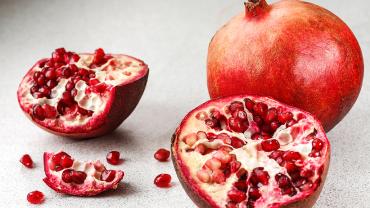
Dietary phenolic compounds (polyphenols) are naturally present in many plant-based foods, such as pomegranates, berries, tea, red grapes, and many other fruits, vegetables, spices, and herbs. Polyphenols are bioactive compounds that have health-promoting properties, which have been shown extensively in research to possess antioxidant and immunomodulatory activity. They can also exert prebiotic-like effects to help support a balanced gut microbiome. It is estimated that 90% to 95% of dietary polyphenols are not absorbed in the small intestine, making them available to be metabolized by the gut bacteria in the large intestine. Increased consumption of these compounds may promote healthy gut microbial diversity.
Gut dysbiosis has been associated with a variety of conditions that are inflammatory in nature, such as inflammatory bowel disease and mood and cognitive disorders such as anxiety, depression, and Alzheimer’s disease. Research shows that specific polyphenols in pomegranates may support mood and mental health. Pomegranate (Punica granatum L.) is a rich source of the polyphenols, ellagitannins and ellagic acid, that stimulate the growth of beneficial gut bacteria Bifidobacterium and Lactobacillus and that intestinal bacteria metabolize into urolithins. As gut-derived metabolites with various biological activities, urolithins are shown to have a variety of health benefits to the host, including cardioprotective, anti-inflammatory, anti-aging, anti-diabetic, and anti-cancer properties.
An in vitro study published in Nutritional Neuroscience evaluated the neuroprotective effects of urolithins from pomegranate extract (PE) on lipopolysaccharide (LPS)-stimulated BV-2 microglial and SH-SY5Y neuronal co-culture cell models and suggest that urolithins may help attenuate neuroinflammation in Alzheimer’s disease. Hippocampal tissues of transgenic Alzheimer’s disease mice were also evaluated after 100 mg/kg or 200 mg/kg per day of urolithin treatment for 3 weeks. In the LPS-BV-2 microglia, urolithins decreased media levels of nitric oxide, interleukin 6, prostaglandin E2, and tumor necrosis factor-alpha. Urolithins also preserved SH-SY5Y cell viability much more than cells that were not treated, and they mitigated apoptosis and caspase release from H2O2-induced oxidative stress. There was an insignificant decrease in inflammatory biomarkers in the high-dose PE-treated mice compared to the controls. Several other studies demonstrated the neurocognitive protective effects of PE in the models of Alzheimer’s disease and Parkinson’s disease showing the ability of urolithins to penetrate the blood-brain barrier. They have been shown to protect neurons from cell death, support neurogenesis, and inhibit monoamine oxidase. More evidence is needed to fully elucidate the roles that these compounds play in supporting neurological health.
Regarding mood support, according to an experimental animal model of aluminum trichloride (AlCl3)-treated mice, pomegranate juice may help moderate anxiety-like and depression-like behaviors potentially through modulating oxidative damage and neurotransmitter activity. Behavior analyses showed that pomegranate juice inhibited AlCl3-induced depressive and anxiogenic effects in the open field, elevated plus maze, tail suspension, forced swimming, and light/dark box tests. Furthermore, 20% concentration of pomegranate juice minimized the AlCl3 toxicity on dopamine, serotonin, and acetylcholinesterase levels in mice brains. Catalase, superoxide dismutase, glutathione S-transferase, and glutathione activities were also enhanced. Human clinical trials are needed to better understand the effects that pomegranate bioactives have on mood and mental health.
Resveratrol (another phytochemical present in pomegranates and red grapes) has been shown to modulate gut bacteria and help maintain gut homeostasis by enhancing the growth of beneficial bacteria and inhibiting the growth of pathogenic species. Some clinical trials have demonstrated its effects in supporting cognitive health, memory, and mood. According to a systematic review and meta-analysis by Marx and colleagues, resveratrol supplementation significantly improved some measures of cognitive performance, including delayed recognition and negative mood.
The current literature is limited and inconsistent regarding the impact of pomegranates on the gut microbiome to support mood. Although more research is needed, patients may consider incorporating more dietary polyphenols in their diets to support the body’s antioxidant status, redox balance, gut microbiome, and overall health.
By Caitlin Higgins, MS, CNS